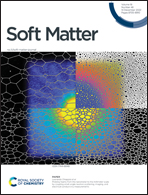Anisotropic sol–gel transition: the influence of sample thickness, pressure and strain†
Abstract
We demonstrate an unprecedented influence of sample thickness (d) and pressure (P) on the gelation of a liquid crystalline nematic host. The temperature at which the anisotropic nematic sol transforms into a nematic gel is weakly dependent on ‘d’ down to its certain value, but surprisingly exhibits a precipitous drop below about 30 μm thickness. Temperature-dependent laser transmission exhibits characteristics of approach to a tricritical point, when d is varied. While the strain dependence of storage and loss moduli exhibit Payne effect/weak strain overshoot, the magnitudes of the moduli and their thermal variation present explicit dependence on d, both behaviours being well described by power-law expressions. Studies at elevated pressures also corroborate the observations of d-dependence with the nematic sol thermal range increasing with P, suggesting reduced favour for network formation. We strongly believe that these experiments pave a new pathway to realize the formation of gel fibres.



 Please wait while we load your content...
Please wait while we load your content...